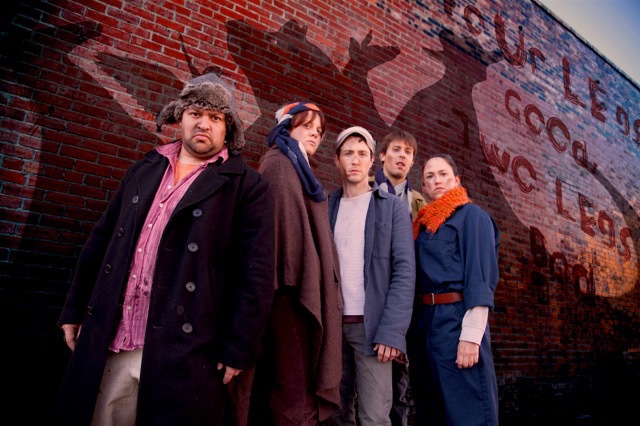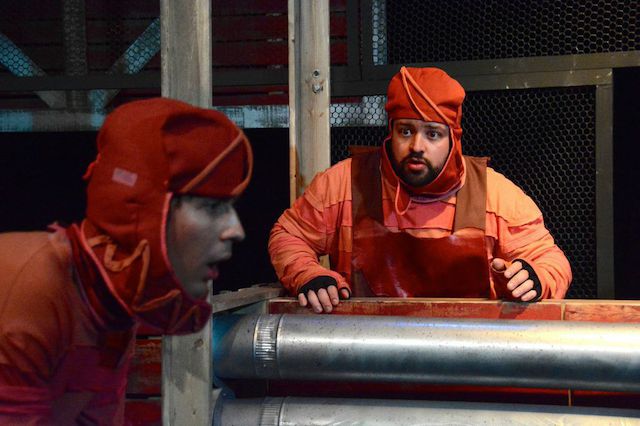A gigantic puppet, booze jug in hand, staggers onstage like a grotesque 16th-century ghoul resurrected straight out of a commedia dell’arte carnival. He collapses, drunk as a skunk. When he’s surrounded by a herd of grunting characters who could be mistaken for models stepping fresh out of a “Project Runway” blue-collar chic challenge—gorgeous leather suspenders, multicolored canvas booties and versatile ushanka-styled headpieces with expandable ear flaps—one has to wonder who is human and who is beast in this original staging of George Orwell’s 1945 literary classic Animal Farm.Adapted by the award-winning Duke City Repertory Theatre to play for 1,100 students in schools around the state as part of its Classrooms Alive program, this tweak on Nelson Bond’s 1964 reader script, designed to be read by actors on stools facing the audience, creates the unexpected in a tale that is infamously predictable. Ghastly human drag invites the audience to identify with the rather tame personifications of the animal players and become, in effect, beasts of the barn. DCRT delivers a surprising and delightful production twist by rejecting the pig snouts, donkey ears and chicken feathers found in most other stagings. In this allegorical narrative about the corrupt cycle of social revolutions, the animals on Mr. Jones’ farm collectively retaliate against his ruthless abuse and neglect and briefly form a utopian society of their own that’s quickly overtaken by an oligarchy of pigs. In signature Orwellian fashion, and in another clever deviation from the novel and custom, the play concludes with the suggestion that this process of revolt will be mercilessly repeated after the lights go down. Beyond these revolutionary coups de théâtre, DCRT’s brave attempt to cram a weighty masterpiece into an hour-long stage play leaves something to be desired in the way of emotional catharsis. Avoiding dialect to make characters approachable is noble and refreshing, but combined with a lack of distinguishable personality traits, it leaves them feeling anonymous and difficult to care about. The versatile costumes allow actors to transform between characters but further efface their individuality. For a production based on Orwell’s truly insidious brand of horror, much needed drama is conspicuously absent, and some opportunities for emotional highs and lows go unclaimed. DCRT strives never to dumb down its art with work that is overtly literal, so while Animal Farm’s lack of nuance and real characterization probably didn’t condescend to younger audiences, it might to some adults.Additionally, the action that director Katie Becker Colón has written into Bond’s script merely parrots the continuous dialogue instead of independently revealing subtext or elements of the unspoken physical struggle unfolding on stage—undoubtedly one of the challenges of staging a read-only script. The result is a compressed production saturated in dialogue taken directly from Orwell’s original narration that misses the bullseye on Colón’s intended target of showing rather than telling.These weaknesses are minor, though. This play is a must-see for its original take on a timeless tale that has been done by much bigger companies with much smaller ambitions.
Animal FarmRuns through March 15Thursdays through Saturdays at 8pm, Sundays at 2pmThe Cell Theatre700 First Street NWTickets: $7 to $22dukecityrep.com, liveatthecell.com, 797-7081










